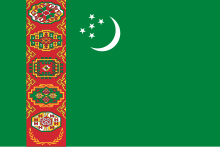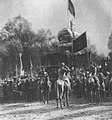The Turkmenistan Portal

Turkmenistan is a landlocked country in Central Asia bordered by Kazakhstan to the northwest, Uzbekistan to the north, east and northeast, Afghanistan to the southeast, Iran to the south and southwest and the Caspian Sea to the west. Ashgabat is the capital and largest city. It is one of the six independent Turkic states. With a population over 7 million, Turkmenistan is the 35th most-populous country in Asia and has the lowest population of the Central Asian republics while being one of the most sparsely populated nations on the Asian continent.
Turkmenistan has long served as a thoroughfare for several empires and cultures. Merv is one of the oldest oasis-cities in Central Asia, and was once among the biggest cities in the world. It was also one of the great cities of the Islamic world and an important stop on the Silk Road. Annexed by the Russian Empire in 1881, Turkmenistan figured prominently in the anti-Bolshevik movement in Central Asia. In 1925, Turkmenistan became a constituent republic of the Soviet Union, the Turkmen Soviet Socialist Republic (Turkmen SSR); it became independent after the dissolution of the Soviet Union in 1991.
The country is widely criticized for its poor human rights, including for its treatment of minorities, and its lack of press and religious freedoms. Since the independence declared from the Soviet Union in 1991, Turkmenistan has been ruled by repressive totalitarian regimes: that of President for Life Saparmurat Niyazov (also known as Türkmenbaşy or "Head of the Turkmens") until his death in 2006; Gurbanguly Berdimuhamedow, who became president in 2007 after winning a non-democratic election (he had been vice-president and then acting president previously); and his son Serdar, who won a subsequent 2022 presidential election described by international observers as neither free nor fair, and now shares power with his father.
Turkmenistan possesses the world's fifth largest reserves of natural gas. Most of the country is covered by the Karakum Desert. From 1993 to 2019, citizens received government-provided electricity, water and natural gas free of charge. Turkmenistan is an observer state in the Organisation of Turkic States, the Türksoy community and a member of the United Nations. (Full article...)
Selected article -

According to a 2009 Pew Research Center report, 93.1% of Turkmenistan's population is Muslim. Traditionally, the Turkmen of Turkmenistan, like their kin in Uzbekistan and Afghanistan are Sunni Muslims. Shia Muslims, the other main branch of Islam, are not numerous in Turkmenistan, and the Shia religious practices of the Azerbaijani and Kurdish minorities are not politicized. The great majority of Turkmen readily identify themselves as Muslims and acknowledge Islam as an integral part of their cultural heritage, but some support a revival of the religion's status primarily as an element of national revival. (Full article...)
WikiProjects
Related portals
Religions in Turkmenistan
Post Soviet states
Other countries
Things to do
General images
Categories
Topics
Associated Wikimedia
The following Wikimedia Foundation sister projects provide more on this subject:
-
Commons
Free media repository -
Wikibooks
Free textbooks and manuals -
Wikidata
Free knowledge base -
Wikinews
Free-content news -
Wikiquote
Collection of quotations -
Wikisource
Free-content library -
Wikiversity
Free learning tools -
Wikivoyage
Free travel guide -
Wiktionary
Dictionary and thesaurus


































